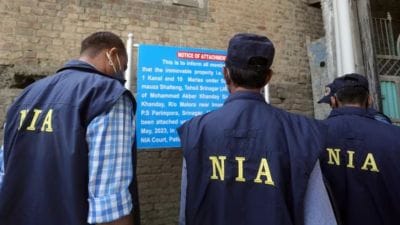Cricket diplomacy is fragile
Should cricket diplomacy, which has added a new spin to Indo-Pak ties, be regarded as a passing phase? Can this diplomacy be held hostage ag...

Should cricket diplomacy, which has added a new spin to Indo-Pak ties, be regarded as a passing phase? Can this diplomacy be held hostage again to Indo-Pak tension some time in the future? Without cricket crazy fans in the subcontinent, even this move might not have paid off. In any case, cricket cannot always dominate Indo-Pak ties and other bilateral activity may not have the same power to move thousands of Indians and Pakistanis across the border or lead to the setting up of special visa cells.
Even as cricket has had the subcontinent glued to the small screen, Pakistan8217;s leaders have not refrained from talking about Kashmir being a priority issue for them. The apparent message is that the hype over cricket should not be expected to change equations at the core of Indo-Pak relations or Islamabad8217;s attitude toward them. On the Indian side, irrespective of whether or not cricket diplomacy was designed to woo Muslim votes, what stands out is that the electoral frenzy has for the first time been unmarked by anti-Pak rhetoric.
Peace has suddenly acquired a new importance after the two nations were virtually on the verge of war for more than a year under the rule of the same governments. Whether or not they were compelled to walk the path of peace by America, the Vajpayee and Musharraf dispensations were also obviously more amenable to giving a serious thought to reviving diplomatic contact and resuming communication links after having tasted the bitter war-like pill. Besides, with television coverage of the Iraq crisis providing a much needed reality check, the idea of war on the subcontinent came laden with images of horror.
Against this background, cricket diplomacy has helped considerably in convincing people that Indo-Pak ties should not be viewed only through the prism of military engagement. Long regarded as permanent enemies, ready to go to war at a minute8217;s notice, cricket diplomacy has contributed to shattering the war-like quality that came to be attached to Indo-Pak ties.
Also, without the small screen, the revolutionary turn in people8217;s attitudes may not have become so visible. It is important to stress this point. After all, both nations have had to travel a long distance in order to bid farewell to open war. What helped the process was their nuclear diplomacy, which rested on a deterrence pact. The pact has been religiously lived up to, with exchanges of lists of nuclear installations and facilities for the 13th consecutive year this January. This ritual was followed even when the armies of the respective nations were deployed in a near war-like state.
This also raises the question as to why the two countries did not talk seriously about peace all this while. Apart from the noises made by India about cross-border terrorism and war being waged by proxy, what were the basic irritants? And has cricket diplomacy rendered these irritants redundant?
While nuclear diplomacy rests on an agreement ritually inked every year, cricket diplomacy rests on the importance accorded to it by the media and public opinion. When nuclear diplomacy was at its peak, public opinion was assumed to be more responsive to war cries. In contrast, cricket diplomacy has been reflective of public opinion favouring the drive for peace. Had public opinion not been the stimulating factor, the Indian government would not have risked the prospect of engaging in cricket diplomacy at a time when a crucial election was looming on the horizon.
But the big question is whether this process can sustain itself over a considerable period of time. There are several factors still that can halt it in its tracks. After all, there is a limit to the role public opinion can play in shaping foreign policy. The Bush administration could ride roughshod over fairly vocal dissent over its Iraq policy and get away with doing so, at least for the moment. Therefore it would be naive to assume that a future terrorist attack of change in government policy could not witness the rolling back of this initiative. In other words, this moment of friendship inspired by cricket is an extremely fragile one, despite the enthusiasm of millions of cricket fans on both sides of the border.
- 01
- 02
- 03
- 04
- 05































